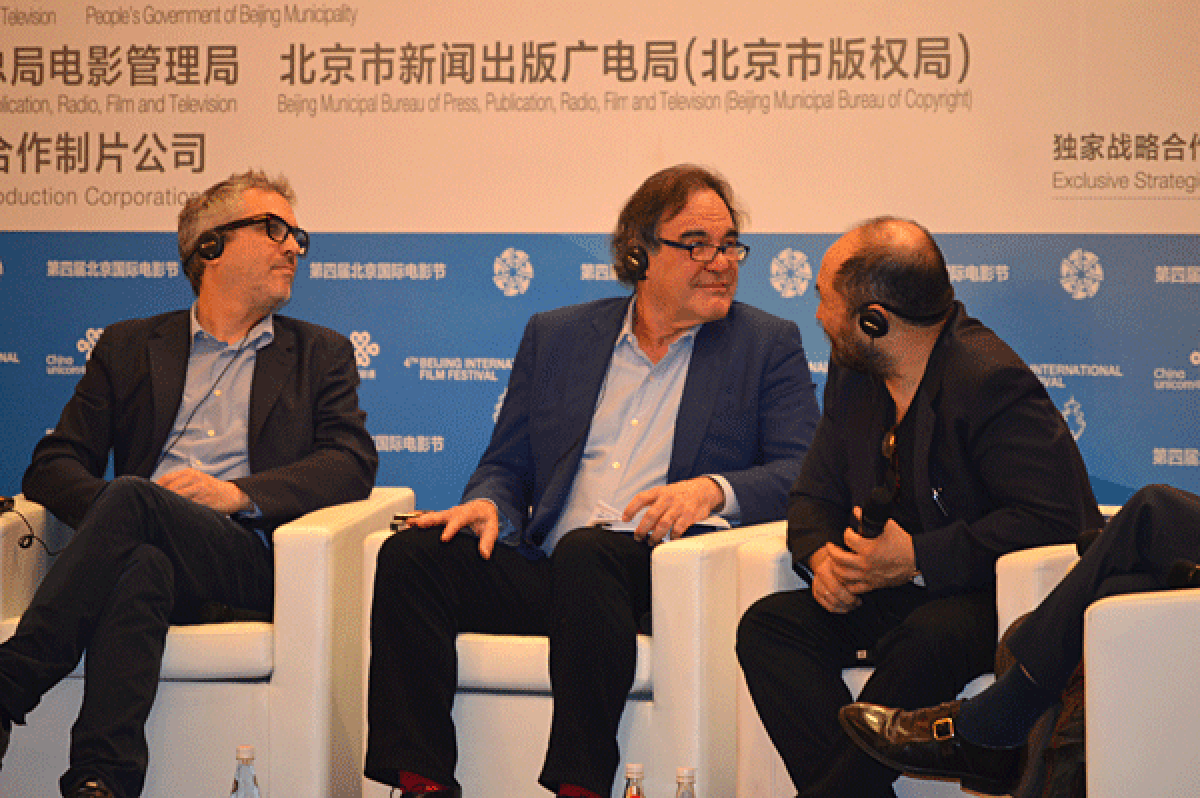In Beijing, Oliver Stone says China’s movies must confront its past

BEIJING – China will never have a world-class movie culture and can’t truly cooperate with foreign filmmakers until authorities stop censorship and allow artists to take a critical look at Chinese history, American director Oliver Stone said Thursday in unusually frank comments that shook up the Beijing Film Festival.
“Mao Tse-tung has been lionized in dozens of Chinese films but never criticized. It’s about time,” Stone said during a high-profile panel discussion on Sino-foreign movie cooperation opportunities, drawing hoots and applause from the audience and making Chinese officials squirm.
“You’ve got to make a movie about Mao. You’ve got to make a movie about the Cultural Revolution. When you do that, you open up, you stir the waters and allow true creativity to emerge in this country. And then, that will the basis of real co-productions. Open up your past, the way the United States has opened up its past.”
REEL CHINA: Full coverage on the Chinese movie industry
With China’s movie market booming – it is now second only to the U.S. in terms of box office receipts – Chinese authorities and many Hollywood directors, producers and studio bosses in the U.S. have been eager to stress “win-win” opportunities for the two sides to collaborate. More sensitive points – like China’s censorship of domestic and foreign movies and its import restrictions on films – are frequently sidestepped at industry events.
Before the panel began, Motion Picture Assn. of America Chairman Christopher Dodd addressed the audience and touted the “tremendous partnership between the China and U.S. film industries that continues to grow and blossom.”
As the director of films including “Wall Street,” “Born on the Fourth of July,” “Platoon” and the 10-part Showtime documentary series “The Untold History of the United States,” Stone has long been known for casting a critical eye on American culture and government and has made several documentaries on Fidel Castro. So perhaps Chinese officials who invited Stone to their dinner party didn’t expect him to begin throwing plates.
Joining Stone on the panel were seven others, including Paramount Pictures chief operating officer Frederick Huntsberry, “Gravity” director Alfonso Cuaron, “Wanted” helmer Timur Bekmambetov and French actor Jean Reno. Zhong Xun, president of the China Film Co-production Corp., moderated the conversation.
Stone said that three times he had tried to make a movie in China, and each time he had “run up against a wall.” Noting that he had repeatedly criticized his own country, Stone said he thought he was “on fair ground” to criticize other countries as well.
ON LOCATION: Where the cameras roll
The director recalled that he had tried to make a movie about Mao in the early 1990s but was rebuffed, and later optioned Anchee Min’s memoir “Red Azalea,” about her experiences during the 1966-76 Cultural Revolution.
This “is a beautiful book about the Cultural Revolution, a young girl … discovering love in an age of repression, lesbian love,” Stone said. “It was everything that China would run from, and indeed, they cut me down, said they would never make a movie about the Cultural Revolution. This was 1998.”
China’s film and TV industry has churned out numerous hagiographies of Mao, who is generally off-limits for direct criticism even though modern Communist Party doctrine acknowledges he was “30% wrong” for policy disasters like the famine-inducing Great Leap Forward of 1958-61. Chinese films have dealt to some degree with the effects of the Cultural Revolution on ordinary people, but have not looked squarely at Mao’s role in orchestrating the decade-long reign of terror.
Six years ago, Stone said he tried again to make a movie in China, as Beijing was getting ready to host the 2008 Summer Olympics. He wanted, he said, to do a documentary on Chinese faces. He and a small crew went around Beijing and gathered photographs of about 200 faces of different people.
“The idea was these are the faces we want to shoot,” Stone recalled. “Chinese officials came in, they looked at faces, they were concerned, they were worried.
PHOTOS: Behind the scenes of movies and TV
“More officials came in, before you know it they said, ‘Well, that is not a Chinese face, we don’t want to show that face, that doesn’t look like a face we are proud of, we don’t want that to be shown.’”
Responding to the director’s comments, Zhong said, “Stone has his own unique thoughts. … But for us, what kinds of films should we choose so these will be really accepted by the audiences?
“It must be accepted by the Chinese people,” Zhong added. “It doesn’t mean you are allowed to do whatever you want to do. You have to understand what this country wants and its requirements to maximize your opportunity to success. So that’s why I say cooperation is not very simple.”
Later, as Zhong told Cuaron a story about visiting Mexico and finding a statue of a Chinese girl in a plaza in Puebla, suggesting perhaps it could be inspiration for another film, Stone cut her off. “You are missing my point,” he said. “It’s all platitudes. We are not talking about making tourist pictures, photo postcards. This is not interesting to us.
“You talk about protecting the people from their own history,” he added. “This whole century is fascinating and you have not dealt with it.”
Though a heavy contingent of Chinese media was present for the panel, few outlets quoted Stone’s comments in their coverage of the event.
Though Stone’s remarks were by far the sharpest of the day, Huntsberry and Cuaron also took a cautionary approach on the issue of “localizing” films and co-productions. “I agree with the filmmakers the term co-production is probably misused and used too often,” Huntsberry said, noting that any attempts to “localize” films must be organic.
PHOTOS: Box office top 10 of 2013 | Biggest flops of 2013
“I think it’s a long time away before we truly can develop movies that can maximize the return in all the countries around the globe or just in the U.S. and China together,” he added, suggesting that cooperation in other areas, such as distribution, might be more fruitful in the short term.
Cuaron, responding to a suggestion from Zhong that “Gravity” did well at the mainland box office because it had Chinese elements that made the local audience feel “very involved,” said inclusion of a Chinese spacecraft was not a matter of tokenism or a specific attempt to appeal to Chinese viewers. It was included simply because it’s a fact in real life – China is in space, along with Russia and the U.S.
“It was never calculated. In that sense I completely agree with Oliver, you cannot calculate the co-productions, in terms of the content. I’m very grateful for the Chinese audiences – and I want to believe that audiences enjoyed the film for what it is, not necessarily only because of the Chinese elements.”
Asked after the panel whether he would consider making a Mao film or Cultural Revolution movie in the United States, Stone said he could never get backing for such an endeavor.
“I couldn’t get distribution. All these companies are scared … that the [Chinese] government would pull their films, if they got upset,” he said.
“It’s a beautiful country,” he added, “but my god, the repression.”
Nicole Liu in the Times’ Beijing bureau contributed to this report.
More to Read
Only good movies
Get the Indie Focus newsletter, Mark Olsen's weekly guide to the world of cinema.
You may occasionally receive promotional content from the Los Angeles Times.







